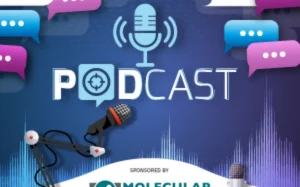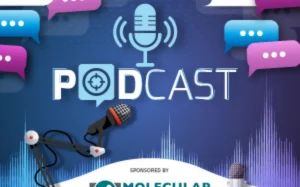Episode 5 – Small molecule screening with Dr Sheraz Gul, Fraunhofer Institute & Dr John Fuller, Beckman Coulter
Posted: 11 January 2022 | Drug Target Review | No comments yet
In this latest episode, we discuss how small molecule discovery can be automated and how this process saves researchers time and money.
In this episode of Drug Target Review’s podcast, sponsored by Beckman Coulter, Deputy Editor Victoria Rees speaks with Dr Sheraz Gul, Head of Drug Screening and Compound Repurposing at the Fraunhofer Institute and Dr John Fuller, Global Commercial Product Manager at Beckman Coulter about the automation of small molecule discovery and development.
Discussing the drug discovery industry, Gul explained that “what we want to do is try and shrink, or condense, the pre-clinical research stage as much as possible, without any compromise and obtain that critical in vivo data that demonstrates the safety and efficacy of a compound.”
Biomarkers aren’t just supporting drug discovery – they’re driving it
FREE market report
From smarter trials to faster insights, this report unpacks the science, strategy and real-world impact behind the next generation of precision therapies.
What you’ll unlock:
- How biomarkers are guiding dose selection and early efficacy decisions in complex trials
- Why multi-omics, liquid biopsy and digital tools are redefining the discovery process
- What makes lab data regulatory-ready and why alignment matters from day one
Explore how biomarkers are shaping early drug development
Access the full report – it’s free!
Gul and Fuller agree that automation can really help researchers to mitigate the challenges associated with the discovery of small molecule drugs. According to Gul, “the whole pre-clinical process can take five or seven years and we now are using automation and computational methods to try and accelerate drug discovery as much as possible.”
“Some of the specific areas where challenges can be alleviated are automating assays, which are a waste of human resources when done manually,” added Fuller.
Also covered in this episode is how drug development has changed in the hit-to-lead phase. Both Gul and Fuller say that newer technologies like CRISPR, next-generation sequencing (NGS), artificial intelligence (AI) and machine learning are leading the way when it comes to the evolution of lead generation.
“In terms of new technologies, such as CRISPR and AI, we can now apply as many of these tools as possible to assay systems. For example, we can do cell-based screening and the cell population in that well can go through mass spectrometry analysis or NGS,” explained Gul.
The speakers also discuss the Beckman Coulter Echo Acoustic Liquid Handling platform that can aid researchers to automate their small molecule screening studies, concluding that equipment that saves time and money for researchers will enable molecules to reach the clinic rapidly.
Keep an eye out for Drug Target Review’s next podcast, coming soon!
Related topics
Assays, Drug Development, Drug Discovery, Drug Leads, Hit-to-Lead, Lab Automation, Robotics, Screening, Small Molecules
Related organisations
Beckman Coulter Inc., Fraunhofer Institute
Related people
Dr John Fuller, Dr Sheraz Gul






